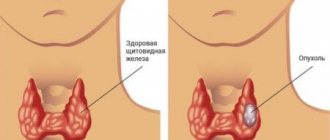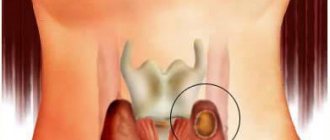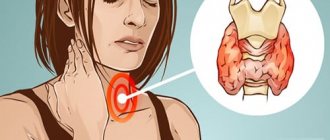What you need to know about the thyroid gland
The thyroid gland, which is located in the neck and is shaped like a butterfly , can have a dramatic impact on a huge number of body functions, and if you are a woman over 35, you have a high risk of thyroid disease - some estimates say more than 30%.
Women have thyroid problems 10 times more often than men, says physician Robin Miller.
Diagnosis and prevention of hormonal level disorders
Thyroid hormones are an integral part of the human body. Monitoring the condition of the thyroid gland is a necessary measure to maintain health.
The functions of an internal organ can be determined using a special examination:
- Ultrasound - shows the shape of the thyroid gland, its size and changes occurring in the gland.
- Hormone analysis - provides information about secretory function.
In order to prevent the development of the disease, you should adhere to basic recommendations, including maintaining a healthy lifestyle, proper nutrition and including more iodized and iodine-containing foods in your diet (flounder, salmon, tuna and seaweed).
As for fruits, it is recommended to increase the amount of bananas, persimmons and oranges. Vegetables include onions, sorrel, garlic and eggplants.
If primary symptoms of thyroid disorders appear, it is recommended to consult a doctor as soon as possible.
Only a specialist can decipher the test results and prescribe effective treatment aimed at eliminating the root cause and relieving symptoms. If measures are taken in time, complications can be avoided.
Thyroid
Located above the Adam's apple, this gland produces a specific hormone called thyroid hormone (TH) , which regulates your body temperature, metabolism and heartbeat, among other things. Problems can begin when yours is hyperactive or, conversely, not active enough. If the thyroid gland is weak, then it produces too little TN, but if it is overactive, then it produces too much.
What can cause the thyroid gland to fail? These could be genetic causes, autoimmune attacks, pregnancy, stress, poor nutrition or environmental toxins, but experts are not so sure. Since the body is full of thyroid hormones - from the brain to the intestines - diagnosing the disease can be a difficult task. Below are signs that your thyroid may be out of whack.
1. Your strength is depleted
Feeling tired and lacking energy has many causes, but they all have to do with hypothyroidism, a disease in which not enough thyroid hormones are produced. If you still feel tired in the morning or throughout the day after a night's sleep, this may indicate that your thyroid gland may not be working well enough. If there is too little thyroid hormone circulating in your bloodstream and cells, it means your muscles are not getting the signals to start working. “The first signal I see is fatigue,” says Dr. Miller.
2. You're depressed
Unusual feelings of depression or sadness can also be a symptom of hypothyroidism. Why? Because by producing too little hormone, the thyroid can affect levels of the “feel good” neurotransmitter, serotonin, in the brain. If the thyroid gland is not active enough, then other systems of the body also “slide”, and therefore it is not surprising that our mood also drops.
3. Nervousness and anxiety
Feelings of anxiety are associated with hyperthyroidism, when the thyroid gland produces too much thyroid hormone. Filled with constant “all systems go!” signals, your metabolism and entire body can become overstimulated. If you feel as if you can't relax, your thyroid may be overactive.
4. Appetite and taste preferences have changed
An increased appetite may indicate hyperthyroidism, where too much hormone production can make you feel hungry all the time. The only difference and, one might say, “plus” of this is that in this case, problems with the thyroid gland due to its hyperactivity compensate for the use of excess calories due to increased appetite, so the person ultimately does not gain weight.
On the other hand, an underactive thyroid gland can create confusion in your perception of tastes and smells.
5. Fuzzy thinking
Of course, unclear thinking can be a consequence of lack of sleep or aging, but cognitive abilities can also take a significant hit as a result of problems with the thyroid gland. Too much thyroid hormone (hyperthyroidism) can make it difficult to concentrate, while too little (hypothyroidism) can lead to forgetfulness and foggy thinking. “When we treat patients for hypothyroidism, they are often surprised at how quickly their brain fog goes away and how much more alert their senses become,” says Dr. Miller. “Many women think it’s something that comes with menopause, when in fact it’s a thyroid problem.”
6. Loss of interest in sex
Weak or lack of interest in sex may be a side effect of thyroid disease. Low hormone levels can cause low libido, but the overall impact of other hypothyroid symptoms - lack of energy, body aches - can also play a role in this issue.
7. Everything is shaking before my eyes
This “shaking” may occur due to increased heart rate. You may feel like your heart is fluttering or skipping a beat, or beating too hard or too fast. You can also notice these sensations on your wrist or at the pulse points on your throat or neck. Heart fluttering or palpitations may be a sign that your system is flooded with hormones (hyperthyroidism).
8. Dry skin
Dry skin, if it also itches, may be a sign of hypothyroidism. Changes in skin texture and appearance are most likely due to a slower metabolism (caused by low hormone levels), which can reduce sweating. Without enough fluid, skin can quickly become dry and begin to peel. In addition, the nails become brittle and voluminous longitudinal stripes appear on them.
9. The intestines began to work unpredictably
People with hypothyroidism sometimes complain of constipation. Insufficient functioning of the thyroid gland causes a slowdown in digestion processes.
"There's no movement in your bowels," says Dr. Miller. “This is one of the three main symptoms of hypothyroidism that I see.”
On the other hand, an overactive thyroid gland can cause diarrhea or more frequent bowel movements. All of these can be signs of hyperthyroidism.
10. The frequency of menstruation has changed
Longer menstrual periods with more bleeding and pain can be a sign of hypothyroidism, where not enough hormones are produced. The periods between periods may become shorter.
In hyperthyroidism, high TH levels cause various types of menstrual irregularities. Periods are shorter or longer, menstruation may occur in very small quantities. “I always ask my patients about their cycles and their regularity,” says Dr. Miller. She discovered a strong correlation between irregular periods and thyroid problems. And if your periods are very difficult, then she also checks for anemia.
11. Pain in limbs and muscles
Sometimes such pain is explained by increased work of muscles and limbs. However, if you experience random and unexpected tingling, numbness, or just plain pain—in your hands, feet, legs, or arms—it could be a sign of hypothyroidism. Over time, insufficient levels of thyroid hormones can destroy the nerves that send signals from your brain and spinal cord throughout your body. This is expressed in such “inexplicable” tingling and pain.
12. High blood pressure
Increased blood pressure may be a symptom of thyroid disease. This may be due to either hypothyroidism or hyperthyroidism. According to some estimates, people with hypothyroidism have a 2-3 times higher risk of developing hypertension. One theory is that low amounts of thyroid hormone can slow the heartbeat, which can affect the force of blood pumping and the flexibility of blood vessel walls. Both can cause high blood pressure.
13. Temperature at zero
Feelings of cold or chills may have roots in hypothyroidism. Inactivity of the body's systems due to low hormone levels means there is less energy in the body to be burned by the cells. Less energy equals less heat.
On the other hand, an overactive thyroid gland causes cells to burn too much energy. This is why people with hyperthyroidism sometimes feel hot and sweat profusely.
14. Hoarseness and strange sensations in the neck
Changes in voice or a feeling of a “lump in the throat” may be a sign of a problem with the thyroid gland. One way to check is to take a good look at your neck for any signs of an enlarged thyroid. You can check your thyroid gland yourself by following these recommendations:
Take the mirror in your hand and, looking at your throat, drink water. Your job is to watch for any lumps or protrusions in the thyroid area, which is located below the Adam's apple and above the collarbone. You may have to do this several times to understand where the thyroid gland really is. If you notice any bumps or anything suspicious, consult a doctor.
15. Problems with sleep mode
Do you want to sleep all the time? This may be due to hypothyroidism. An underactive thyroid can slow down your body's functions to the point that sleeping (even during the daytime) may seem like a brilliant idea.
Can't sleep? This may be due to hyperthyroidism. High hormone levels can result in anxiety and increased heart rate, which can make it difficult to go to sleep or even cause you to wake up in the middle of the night.
16. Weight gain
Plus two sizes in clothes - there are so many reasons for this circumstance that it is unlikely that your doctor will consider an increase in everything as a symptom of a potential thyroid disease. However, weight gain is one of the main signals for Dr. Miller to have her thyroid checked. “Patients report that they are not eating more than usual, but they are still gaining weight,” she says. “They do the exercises, but nothing changes. They can't reset it." Almost always the cause is the thyroid gland, says Miller.
On the other hand, unexpected weight loss may signal hyperthyroidism.
17. Hair is thinning or falling out
Dry, brittle hair or even hair loss can be a sign of hypothyroidism. Low hormone levels disrupt the hair growth cycle and put many follicles into “rest” mode, resulting in hair loss. “Sometimes even all over the body, including the eyebrows.” “A lot of patients talk about hair loss,” says Miller. They say, “My hairdresser says my hair is falling out and I need to ask the doctor about the condition of my thyroid.” Hair salons are more aware of thyroid problems than some doctors!“
Excess thyroid hormones can also affect the amount of hair you have. Symptoms of hyperthyroidism that affect the hair usually include thinning hair on the scalp only.
18. Problems with pregnancy
If you have been trying to get pregnant for a long time without success, this may be due to an excess or deficiency of thyroid hormones. Difficulty conceiving is associated with a high risk of undiagnosed thyroid problems. Both hypothyroidism and hyperthyroidism can interfere with the ovulation process, which affects your ability to conceive. Thyroid diseases also lead to problems that arise during pregnancy.
19. High cholesterol
High levels of low-density lipoprotein (LDL) that are unaffected by diet, exercise, or medications may be related to hypothyroidism. An increase in the level of “bad” cholesterol can be caused by a “underfunction” of the thyroid gland and be a cause of concern. If hypothyroidism is left untreated, it can lead to heart problems, including heart failure.
Get your thyroid tested
If you have one or more of these symptoms and you suspect the cause is a problem with the thyroid gland, then consult your doctor and ask for tests for thyroid-stimulating hormone (TST), free triiodothyronine (fT3), free thyroxine (fT4), and do an ultrasound of the thyroid gland - says Dr. Miller. Based on test results, symptoms and examination, you may be prescribed synthetic hormones. Testing and prescribing treatment for thyroid disease can involve some trial and error, so be prepared to visit your doctor several times to ensure the correct dosage is prescribed.
Get treatment
When it comes to your thyroid, prepare to be your own advocate. Some doctors may neglect thyroid diagnoses, even though the American Endocrinology Association narrowed the normal range for thyroid hormones from 0.5–5.0 to 0.3–3.04 in 2003.
This means more women are eligible for treatment. "Find a doctor who treats, not just tests," says Dr. Miller. “If you feel improvement at a certain dosage, then that carries the same weight as the lab result.” published
PS And remember, just by changing your consciousness, we are changing the world together! © econet
The role of thyroid hormones
As mentioned above, the thyroid gland produces two hormones - T3 and T4. They have a very important mission. Which one exactly remains to be seen.
The main processes regulated by thyroid hormones:
- regulation of metabolism;
- maintaining tissue respiration;
- control over the formation of heat in the body.
Following the advice of doctors, you need to contact an endocrinologist as early as possible, at the first signs of trouble. Any, even minimal changes in well-being may indicate a developing pathology in the body. This is especially true for the thyroid gland. This organ is vulnerable to unfavorable environmental factors, under the influence of which serious thyroid diseases develop. The further the disease has progressed, the more time and effort treatment takes.
If treatment is started at an early stage of the disease, you can count on its maximum effectiveness. In advanced cases, with a progressive disease, recovery is delayed, despite the ongoing therapeutic measures.











